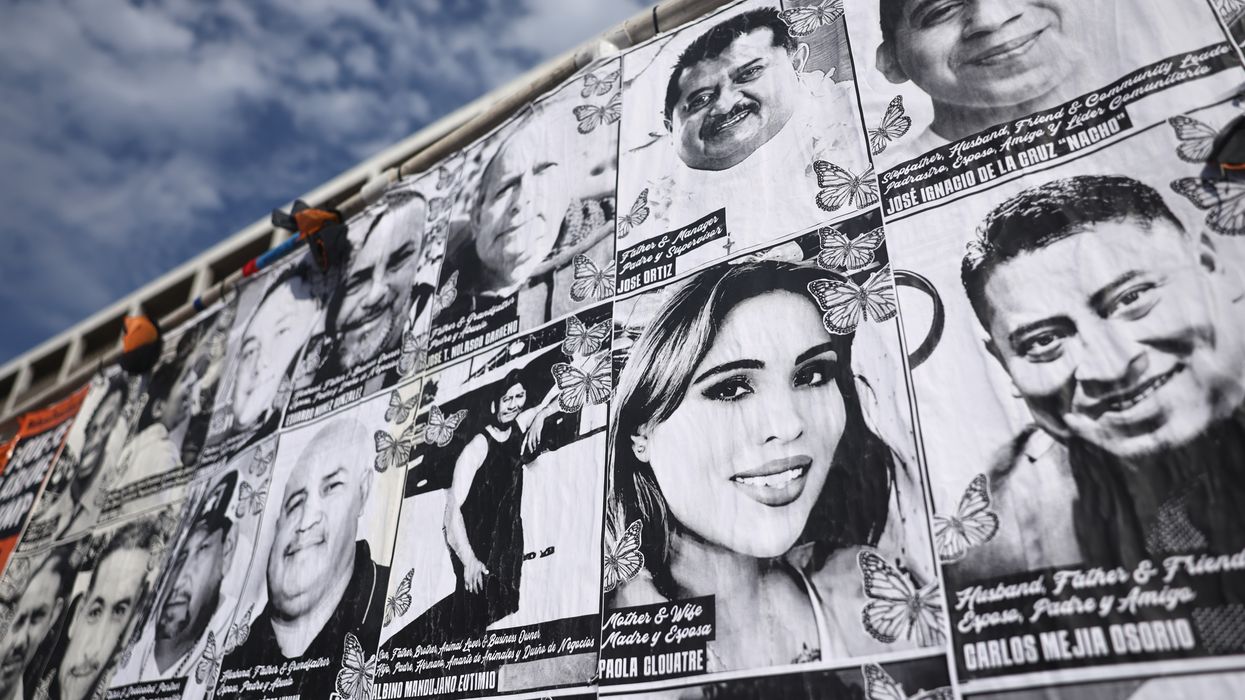You won’t have your names when you ride the big airplane,
All they will call you will be “deportees”—“Deportees,(Plane Wreck at Los Gatos)” Woody Guthrie, 1948
On January 28, 1948 a small plane transporting 28 migrants with three flight crew members and a guard departed Oakland bound for a deportation center in El Centro, California near the Mexican border. The aircraft, which had come from Burbank, however, had been switched in Oakland to a smaller aircraft. It was now loaded with more passengers than outfitted for, and overdue for a required safety inspection. It never reached El Centro.
Near Coalinga, California in Fresno County, the airplane caught fire in midair, and fell to Earth, “crashing in a spectacular fireball” in Los Gatos Canyon, killing all aboard. The crash was reported in The New York Times, San Francisco Chronicle, and other outlets, with the names of the crew and guard. The others who horribly died were identified only, as the Times put it, as Mexican nationals who entered the United States Illegally (though one was actually a Spaniard and another Filipino, as author-artist Tim Hernandez told National Public Radio 60 years later).
Or as legendary folk singer and social activist Woody Guthrie, who was moved to honor the migrants left nameless in one of the most iconic protest songs in U.S. history, put it: “Who are all these friends, all scattered like dry leaves? The radio says, "They are just deportees.”
On multiple levels, the haunting words and tones of “Deportee” have even more resonance today.
Since 1948, Woody’s plaintive song has been recorded by scores of legendary musicians and featured in a book by Hernandez. What brought it back to life this week was the announcement July 14, Woody’s 113th birthday, of the release of an unearthed collection of home recordings made available now through the use of new equipment and software. The newly released tapes would be his last due to his early signs of Huntington’s disease. Woody never studio recorded “Deportee,” it was “lost to history, until now,” as the Rolling Stone notes.
Introducing disclosure of the 20 newfound gems, including home recordings of many of his classics, The New York Times reports that his estate and record company fittingly chose to publicly release one particular song, “Deportee.”
It was a decision surely reflective of the politics of a songwriter whose guitar was famously adorned, “This Machine Kills Fascists.” And whose working-class politics are beautifully delineated by this nugget in the Times report: “‘Backdoor Bum and the Big Landlord,’ a parable about two characters trekking toward heaven. The bum has practical skills—building a fire, cooking a stew—while the landlord weighs himself down with gold, expecting to buy his way into salvation. In a Woody Guthrie song, that doesn’t happen.”
Though not mentioned by Times, the selection of “Deportee” is highlighted in a Rolling Stone headline as “an Ode to Deported Workers, [That] Has Never Been More Relevant.” On multiple levels, the haunting words and tones of “Deportee” have even more resonance today.
For a nation of immigrants—none of us are native, save Indigenous peoples—immigration has long been controversial, especially of those less desired due to race or ethnicity, other than enslaved people dragged in by chains. Restrictive immigration laws date to as early as a 1790 act which required immigrants to be “free white persons.” Similar racist intent characterized the notorious 1882 Chinese Exclusion Act and 1924 Johnson-Reed Act, which gave special preference to white immigrants from Northern and Western Europe.
But the nation has also long depended on the hard labor—from the fields to transcontinental railroads to garment factories, construction, and meat processing plants of today—of immigrants of color who could be exploited with low wages, harsh living conditions, and coercive threats of deportation.
Unleashed by U.S. President Donald Trump, Miller and his fellow immigrant haters have adopted the most racist and militaristic practices of the past, and the same disregard to who is rounded up.
Mass deportations are sadly not new either. They include a large early 1930s Depression expulsion of migrants of Mexican descent, though 60% were American citizens. Until now the most notorious mass expulsions occurred in 1953-54 under the racist title of “Operation Wetback,” estimated to seize as many as 1.3 million low-income migrant workers. “Tens of thousands of immigrants were shoved into buses, boats, and planes and sent to often-unfamiliar parts of Mexico, where they struggled to rebuild their lives,” writes Erin Blakemore.
“In Chicago,” she continues, “three planes a week were filled with immigrants and flown to Mexico. In Texas, 25% of all of the immigrants deported were crammed onto boats later compared to slave ships, while others died of sunstroke, disease, and other causes while in custody.”
“The short-lived operation used military-style tactics to remove Mexican immigrants—some of them American citizens—from the United State,” notes Blakemore. It has no doubt served as a model and inspiration to Stephen Miller, the fanatical architect of today’s mass deportation crusade.
Unleashed by U.S. President Donald Trump, Miller and his fellow immigrant haters have adopted the most racist and militaristic practices of the past, and the same disregard to who is rounded up. They have escalated the mass deportations to new depths, flagrantly flaunting court orders, with masked secret agents in unmarked vehicles kidnapping people and terrorizing immigrants and communities of color.
Their campaign was kicked off with the mid-March dispatch of three planeloads of hundreds of mostly Venezuelan men, only 32 with criminal accusations, renditioned in secret, with no notice to their families or attorneys and with no due process to a notorious torture prison in El Salvador.
As with the Los Gatos Canyon deportees, none had their names disclosed. But within days, court filings revealed that at least one man, Kilmar Abrego Garcia, had been mistakenly deported. By April, about 90% were shown to have no criminal record. They included gay makeup artist Andry Hérnandez, Venezuelan professional soccer player Jerce Reyes, baker Neri Alvarado whose alleged “gang” tattoo was actually an autism awareness image honoring his brother, and Frengel Reyes, all ultimately identified by family members, careful legal work, and media investigative research.
Unlike the 1948 crash, or the 1930s and 1950s mass deportations, most of their names eventually became known due to the rise of multiple immigrant legal rights groups and sleuthing of investigative reporters and families. After months of legal work and public protests, 250 of the Venezuelans have been finally released from the Salvadoran prison and flown to Venezuela. It’s an alarming prospect for anyone who came to the U.S. for legal protection due to credible security concerns in their native country.
Subsequently, the Trump administration doubled down with other renditions of immigrants to foreign, often failed and dangerous countries, where the deportees may not speak the language or have any resources. When Trump and Miller realized dispatching alleged gang members and undocumented people already in prisons was not generating the numbers they desired, they turned to setting arbitrary quotas of 3,000 abductees a day.
That led to the daily Gestapo-style raids of farms, factories, construction sites, Home Depot parking lots, and courthouses where immigrants have gone to fulfill their legal obligations. The raids have targeted mostly brown and Black people, whether legal immigrants, people with temporary protected legal status, even citizens. And, as reports have found, most with no criminal record. The draconian crusade has engendered a fierce backlash by other Americans that has led to plummeting poll support for Trump’s signature issue of immigration policy.
As Woody sang:
Some of us are illegal, and some are not wanted,
Our work contract’s out and we have to move on;
Six hundred miles to that Mexican border,
They chase us like outlaws, like rustlers, like thieves.
Most of those being seized today are regular working people—day laborers, restaurant and hotel employees, meat processing workers, janitors, landscapers, and farm workers. Though it takes family members, immigrant rights attorneys, and activists to find them, they now have names—and often videos of brutal assaults while being grabbed by masked secret agents—widely circulated so others can recognize what their neighbors are enduring and demand justice.
For the deportees honored by Woody Guthrie, it took author Hernandez and another “son of a migrant farm worker, just like myself” years later to find a list of the names in “annals of the Fresno County Hall of Records,” he explained to NPR in 2013, and their burial site in a mass Fresno grave marked with a headstone from an anonymous donor that just reads, "28 Mexican Nationals Who Died In A Plane Crash Are Buried Here." Hernandez gave “these 28 passengers what every human being is afforded, and that’s the right to have their name. Our names are really what represent who we are.”




